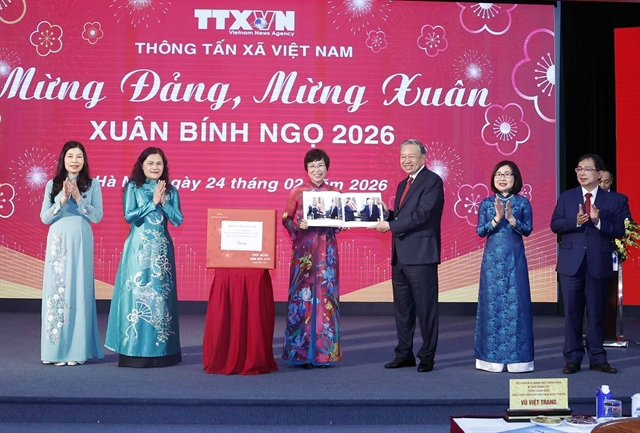 Society
Society

Lê Huỳnh Ngọc Thủy is among few women in leadership roles in IT, a sector which people often think is stereotypically for males rather than females.

|
Quàng Thị Nguyệt became the first National Assembly deputy at the age of 24 in Việt Nam in 2021. Photo courtesy of Nguyệt
Vân Nguyễn
You won't find many women calling the shots in the work place. It's a fact that there are three times as many men in leadership positions than women.
Lê Huỳnh Ngọc Thủy bucks that trend.
She leads an IT team, a sector which people often think is stereotypically for males rather than females.
The 32-year-old software engineer manages 15 developers for a foreign company in Việt Nam. Her main tasks include coding, managing projects and leading a team of developers.
“Many still think that IT jobs are for men but it’s not true at all," Thủy said.
"Whether one can do IT or programming lies in their capabilities, not their gender.”
Despite outperforming many countries in females in the workforce, Việt Nam has a low rate of women in leadership and management roles. Less than one-quarter of overall management roles are women.
In 2019, the country had nearly 400,000 male leaders, managers and administrators however, the number of female fellows is only a third of that.
Achieving gender equality and empowerment of women and girls is one of 17 of Việt Nam’s Sustainable Development Goals. The country considers increasing women’s participation in politics as an important factor towards women’s empowerment and a premise to minimise discrimination.
The proportion of female deputies to the 15th National Assembly reached 30.26 per cent, putting Việt Nam in 51st position globally in terms of the percentage of female parliamentarians.
Quàng Thị Nguyệt became the first National Assembly deputy at the age of 24 in Việt Nam.
She belongs to the Khơ Mú ethnic minority group which has a population of a little over 90,000 people in Việt Nam.
Nguyệt was born in the remote mountainous commune of Mường Mươn in Điện Biên Province and among the very few from her area to attend university.
Witnessing the pervasive gender inequality in her area, Nguyệt said she has constantly strived to make herself more competent.
“Knowledge is key to liberating ourselves from gender stereotypes and affirming our position in society,” she said.
‘Unconscious bias’
While gender inclusion and equality help firms thrive, many businesses are yet aware of gender issues in their corporate environment.
“Workplace gender equality, especially gender diversity in leadership and management, brings great benefits to businesses,” Đinh Thị Thu Hoài, executive director of the Việt Nam Business Coalition for Women’s Empowerment (VBCWE) told Việt Nam News.
"It helps to foster creativity, enhances transparency and risk management capabilities while helping to bring in effective solutions and to recruit and retain talents.
“Gender equity, diversity and inclusion are especially meaningful to Millennials and Generation Z and have become one of the factors for them to consider when choosing a place to work.
“Gender equality, diversity and inclusion are a global trend. If Việt Nam wants to integrate deeper into the global economy, fostering gender equality is vital. It helps companies build positive brands which attract investors, consumers, and partners.”
However, prejudice about the sexism-based roles and low awareness of gender issues is still holding back women.
“Women are less likely to be given the opportunity to advance to senior leadership positions due to the perception that women do better in supporting roles and men do better in leadership positions,” Hoài said.
Many firms even mistake gender equality with delegating jobs based on gender traits.
Hoài added: “The most popular misinterpretation of workplace gender equality is organising activities on women’s days and jobs segregation within the organisation based on gender traits, which is erroneously considered favourable for women as they will have more time for families,.
"Individuals should not be locked into stereotypes.”
The director said the “unconscious bias” may keep women out of senior roles.
“Leadership traits are neither inherent to men nor women," she said.
"There also needs to be a shift in mindset on how leadership is defined and what that entails.
“If you look at the women leaders, and there are many examples in the VBCWE network alone, and how they’ve contributed to the success of their company and industry, they have been able to prove that these biases and stereotypes are wrong.”
Thủy said she never felt daunted being a women team leader.
“If there is anything that daunts me at work, it’s the heavy workload and the large team I have, not that I am a woman or my team members are mostly male,” she said.
For the IT industry, as long as one finds themselves suitable with IT and enjoys the job, then they can fulfill the tasks very well, Thủy said.
“I often tell women not to limit themselves with stereotypes. Women should pursue their careers and not be limited in terms of access to opportunities.” VNS




